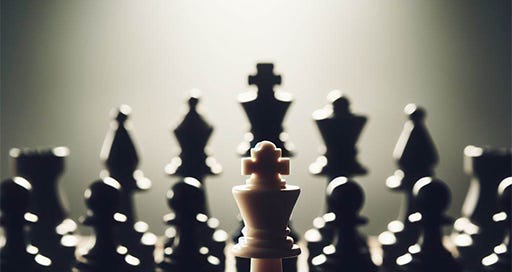One of the more idiosyncratic aspects of the Western media's analysis of current geopolitics is the focus it places on the personalities and characteristics of the major players involved in the modern version of what was described in the 19th Century as the Great Game. Even stranger than this is the way that the United States and the United Kingdom appear to base their military strategies around specific individuals.
Say what you will about the present situation in Ukraine, but regardless of one’s opinions concerning the various rights and wrongs, one would think it was entirely obvious that the following is not a viable plan for victory:
Declare that Ukraine is winning no matter what happens on the battlefield.
Assume these declarations will cause the Russian people to lose confidence in Vladimir Putin despite his 83 percent approval rating.
Assume the approval ratings are fake and that the Russian people’s lost confidence in Vladimir Putin will cause them to rise up in rebellion against the Russian government.
Assume the Russian people’s rebellion will be successful and drive Vladimir Putin out of office.
Victory?
In other words, the West’s entire strategy for winning the war in Ukraine relies upon the relationship between the Russian President and the Russian people. Which, naturally, raises the question of precisely what the nature of that relationship is. And that the nature of that relationship depends heavily upon the Russian leader’s core SSH profile and pattern of behavior.
Vladimir Putin is, like all other national leaders, male and female, a situational alpha in the political hierarchy. But that doesn’t make him an Alpha in terms of his natural inclinations; one has only to look at the massive difference between a genuine Alpha like Donald Trump and a thirty-something party girl, such as recent Finnish Prime Minister Sanna Marin, to recognize that situational rank is not necessarily determinative of behavioral patterns.
So, which of the various SSH profiles best fits Vladimir Putin? A recent book by Giuliano da Empoli, The Wizard of the Kremlin, paints a highly-specific psychological portrait of the man to whom the protagonist customarily refers to as “the tsar”. Consider a few of the relevant quotes from the book:
“In the West, your leaders are like teenagers, they can’t bear to be alone, they’re always wanting someone to see them. You get the impression that if they had to spend a whole day in a room, deprived of company, they’d dissolve into the atmosphere like a gust of warm air. Our tsar, on the other hand, lives in solitude and thrives on it. Contemplation is what gives him the strength that surprises so many of your observers.”
The tsar’s ideal would be more like a cemetery in which he stood alone, vertical, the sole survivor among all his enemies and even all his friends, relatives, and children.
The tsar was not yet the tsar. His gestures did not then convey the inflexible authority they would later come to acquire, and though his gaze had some trace of the mineral quality we recognize in it today, it was as if veiled by a conscious effort to keep it under control. That said, his presence communicated a sense of calm.
Throughout the meeting, Putin had behaved with impeccable courtesy toward Boris. Deference even, as he listened to the businessman’s advice. Yet when Berezovsky addressed him in his usual familiar way, I thought I saw a trace of irritation in Putin’s eyes. And then there’d been that glimmer of irony at the end, when Boris promised to guide him step-by-step. As if the FSB chief found the mere thought of taking this man’s guidance highly comical.
This is all strongly indicative of Sigma behavior. Further evidence can be seen in Putin’s response to the suggestion that he succeed the charismatic Alpha, Boris Yeltsin, as President of Russia.
“I hear you, Boris, but what makes you think I am that leader? I’ve spoken in public three or four times, and I can guarantee you the results were not brilliant. I’ve seen the president in action any number of times: he walks into a room, susses out the atmosphere, and a second and a half later he’s got everyone eating out of his hand. He makes them laugh, he makes them cry, he builds a relationship with them as though he’d sat down with each of them at his kitchen table. Even today, even in his present state, he can still do it. People see him and they’re moved. I’m not cut from that cloth.”
In addition to the relevant political and psychological elements, it is also clear that Putin has high sexual status, as the picture of the former Olympic gymnast, who is the mother of four of his children despite not being his wife, should suffice to demonstrate.
It should be readily apparent that Vladimir Putin is an almost textbook Sigma. And the obvious and significant distinctions between Alpha leaders like Trump and Yeltsin, and a Sigma leader like Putin, should make it clear why it was necessary to create the Sigma profile in the first place. In fact, it even shows why the Western military strategy for victory in Ukraine, aside from being ill-founded and asinine, is fundamentally irrelevant, because the idea of losing popular support being sufficient to undermine a political leader fundamentally assumes an Alpha being the target.
Each SSH profile exhibits markedly different patterns of motivation and behavior. Anyone who has ever reported to a Delta boss, or a Gamma boss, is very well aware of the way their behavior tends to vary greatly from that of an Alpha boss. And human behavioral patterns that apply to the corporate world necessarily apply to the political and military worlds as well, because human behavior encompasses every aspect of humanity and human relations.
The more that geopolitics, rightly or wrongly, relies upon the analysis of specific individuals, the more it needs to take the Socio-Sexual Hierarchy into account.






A good tell for Sigma was how the business leaders of Russia bristled at Putin. Rival alphas who didn't like the way Putin was treating them. Similarly with Xi there was the purge of uncooperative business leaders in China.
Alphas like Trump are loved by business leader alpha rivals and Trump was constantly getting sucked up to by them.
I believe the difference is that Alphas are vulnerable to flattery and Sigmas are not. Flattery is a very hierarchy cementing interaction so alphas need those public displays to keep their group going. Vox called it 'showing due respect'. On the other hand I've seen Sigmas take flattery all sorts of different ways, most commonly accepting the praise in the moment but not publicly reciprocating it with a hierarchy cementing pat on the head which then enrages the other party.
"Our tsar, on the other hand, lives in solitude and thrives on it. Contemplation is what gives him the strength."
The torch of his ancestors has been passed to him. In contemplation they counsel him.